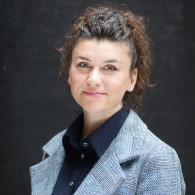
“Gender and the Holocaust: Sexual Violence against Jewish Women in Nazi-occupied Ukraine”
Professional Background
Dr. Marta Havryshko holds a PhD in History from the Ivan Franko National University of Lviv (Ukraine). She is currently Research Associate at the Department of Contemporary History of the I. Krypiakevych Institute of Ukrainian Studies of the National Academy of Sciences of Ukraine. Her research interests are primarily focused on sexual violence during World War II and the Holocaust, women's history, feminism, and nationalism. Her recent publications include a book, Overcoming Silence: Women's War Stories (2018), as well as articles such as, "Women’s Bodies as Battlefield: Sexual Violence during Soviet Counterinsurgency in Western Ukraine (1944-1953)” in Euxeinos. Governance and Culture in the Black Sea Region, 9 (2019); “Rape in Hiding: Sexual Violence during the Holocaust in Ukraine” in Holokost i Suchasnist, 17 (2019, In Ukrainian); and, “Love and Sex in Wartime: Controlling Women's Sexuality in the Ukrainian Nationalist Underground” in Aspasia, 12 (2018). Dr. Havryshko’s research has been supported by the German Academic Exchange Service (Deutscher Akademischer Austauschdienst, DAAD), Yahad-In Unum, Monash University, Canadian Institute of Ukrainian Studies, St. Gallen University, amongst others.
Fellowship Research
Dr. Havryshko was awarded a 2019-2020 Diane and Howard Wohl Fellowship at the Jack, Joseph and Morton Mandel Center for Advanced Holocaust Studies for her research project, “Gender and the Holocaust: Sexual Violence against Jewish Women in Nazi-occupied Ukraine.” This project applies a feminist perspective, placing gender at the forefront of analysis, and aims to provide space for women’s voices about their sexual victimization and agency. During her tenure, Dr. Havryshko seeks to analyze the patterns, forms, topography, dynamics, functions and consequences of sexual violence against Jewish women and girls in times of Shoah. Furthermore, her project analyzes how cultures ideas about the body, sexuality, reproduction, as well an ethnic, racial, national, religious, political identity, combatant status, the position of power contributed to perpetrators' motivations and strategies for sexual violence, as well as victims'/survivors’ experiences of these processes.
